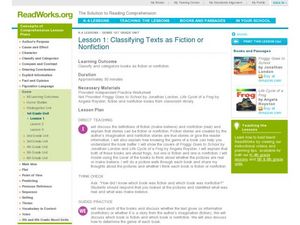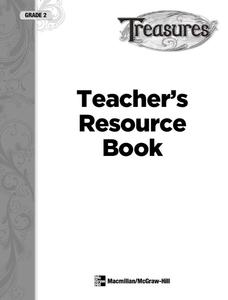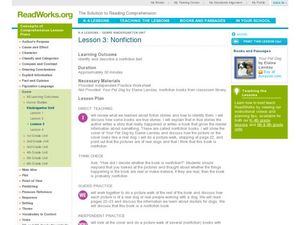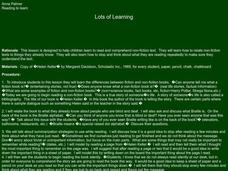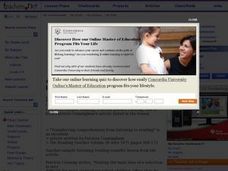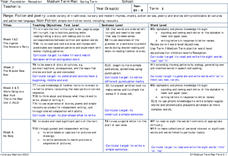Curated OER
Introduce Vocabulary: Dinosaur Bones (Barner)
Dig into some prehistoric vocabulary in Bob Barner's informative book Dinosaur Bones. This works best if you introduce the primitive words before reading the story. These are the focus terms in the text: ancient, climate, extinct,...
Curated OER
Who Would Win? Killer Whale vs. Great White Shark Storia Teaching Guide
Teacher guides are wonderful tools with tons of ideas that help you relate content in many different ways. Using the high-interest book, Who Would Win? Killer Whale vs. Great White Shark, learners hone their discussion and reading...
Curated OER
Visual and Meaning Cues
Learn how to apply visual and meaning cues to reading unknown words. Readers will explore what to do when they come to a word they do not know as they watch the teacher model the use of these cues and then participate in guided and...
Curated OER
Lesson 1: Classifying Texts as Fiction or Nonfiction
First graders characterize fiction and non-fiction books, they discover the characteristics of each type of book and compare two books (one fiction & one nonfiction) about the same subject. They make a list that describes what makes...
McGraw Hill
Phonics Teachers Resource Book
Looking to improve your classes literacy program? Then look no further. This comprehensive collection of resources includes worksheets and activities covering everything from r-controlled vowels and consonant digraphs, to the different...
Curated OER
Making Predictions by Analyzing Key Ideas and Details
Learners make predictions. In this language arts lesson, students read nonfiction texts and make predictions about what they are going to read. Learners confirm and revise their predictions as they read the text.
Curated OER
Lesson 3: Nonfiction
Introduce young readers to the word of non-fiction. They examine the features found in non-fiction books such as, facts, dates, and realistic pictures. They discuss how the images in the book Your Pet Dog depict real dogs doing real...
Curated OER
Glossaries
Explore text structure with a focus on the glossary feature in informational texts. Learners read a brief introduction before examining a glossary from a text about plants. They reference it while completing four comprehension questions....
Curated OER
What Do You See at the Pond?
With What Do You See at the Pond?, young readers explore pond life and practice reading strategies. Learners first make predictions and then read the simple story independently. After a second read-through with a partner, kids come...
Curated OER
Reading to Learn
Children learn to read and comprehend non-fiction text and explore how to relate non-fiction texts to things they already know. They then examine how to stop and think about what they are reading repeatedly to make sure they understand...
Curated OER
Introducing Vocabulary: Christopher Columbus (Weinberger)
The story of Christopher Columbus has fascinated young historians for centuries; use this vocabulary-in-context strategy to dive into Kimberly Weinberger's picture book about this classic explorer. Begin by introducing the new words:...
Curated OER
Introduce Vocabulary: A Picture Book of Abe Lincoln (Adler)
The story of Abe Lincoln serves as the backdrop to this vocabulary-in-context activity as you read David Adler's A Picture Book of Abraham Lincoln. Scholars learn these politically themed words before listening to you read the story...
Curated OER
Build Mastery: Purpose for Reading
Do you agree? Set up three stations in your room for this reading comprehension activity: I agree, I disagree, and I'm not sure. Learners listen to statements and walk to the sign that best describes their response. Model this with an...
Curated OER
Are Plants Useful to Man?
Here is a presentation geared toward very young learners. Each slide includes one or two sentences using simple text and related clip art to describe and illustrate one way we use plants in our everyday life. This PowerPoint provides...
Curated OER
Reading Comprehension Exercise
Looking to increase reading comprehension? Teach this lesson, which is flexible enough to use with either informational texts or with literature. Teams of boys and girls work together to answer a comprehension question after listening to...
Curated OER
Guided Reading: Main Idea
Readers are presented with a list of three questions and asked to actively listen to a story or article to answer them. They verbally answer the questions to learn the strategy. Next, read a story to them or have them silently read a...
Curated OER
The Best Main Idea
What is the main idea? Interest your young readers with this fun introductory lesson! After selecting several items from a paper bag, the teacher leads learners to determine the big idea for those items. This concept is then applied to...
Curated OER
K-W-L Chart
After choosing a topic of interest, young learners use the K-W-L thinking process to create an informational, illustrated, big book. K-W-L, a three-part thinking process, asks the learner to respond to three questions: What do we know...
Curated OER
What is a Biography?
Investigate biographies with your class. Compare autobiographies and biographies of Martin Luther King, Jr. as an example. Learners explore the factual components that make up a biography and locate several biographies of notable...
Curated OER
Build Mastery: Making Inferences
Do your youngsters realize that they are constantly making inferences? Expose this inner process by bringing out the book they will be reading. Ask scholars what they think the plan is, and explain that their answers are the product of...
Curated OER
Connection Stems
Learners connect their lives to a story or nonfiction text. In this reading connections instructional activity, students make text-to-self, text-to-text, and text-to-world connections as they complete connections stems based on a story.
Curated OER
Distinguishing Fiction and Non Fiction
Have your class go on picture walks of different books, and identify them as either fiction or non fiction and why. Working in groups, kindergartners state whether the book tells information or comes from the author's imagination. Use...
Curated OER
Fiction and Poetry
Students explore fictional text and poetry. They explore the story structures used in the types of texts and examine the language patterns used. Students practice tracking text in the correct manner.
Curated OER
Writing Process- Expository Writing
Expository writing is the focus of the language arts lesson presented here. In it, young writers review what expository writing is through a class discussion and teacher demonstration. Then, learners write expository text that describes...
Other popular searches
- Nonfiction Text Features
- Nonfiction Text Structures
- Types of Nonfiction Text
- Features of Nonfiction Text
- Fiction and Nonfiction Text
- Nonfiction Text Elements
- Infer Nonfiction Text
- Parts of Nonfiction Text
- Summarizing Nonfiction Texts
- 6 Nonfiction Text Structure
- Inquiry and Nonfiction Text
- Reading Nonfiction Text





